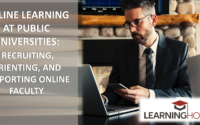
Teaching in Graduate Distance Education: Perspectives on Evaluating Faculty Engagement Strategies.
To mitigate the effects of transactional distance, it is incumbent upon online instructors to intentionally and thoughtfully incorporate and implement strategies that will create a successful learning environment, keep learners motivated, and provide a rewarding learning experience where learners feel supported, valued and connected. The authors, both of whom are long-standing faculty coaches and instructors […]












